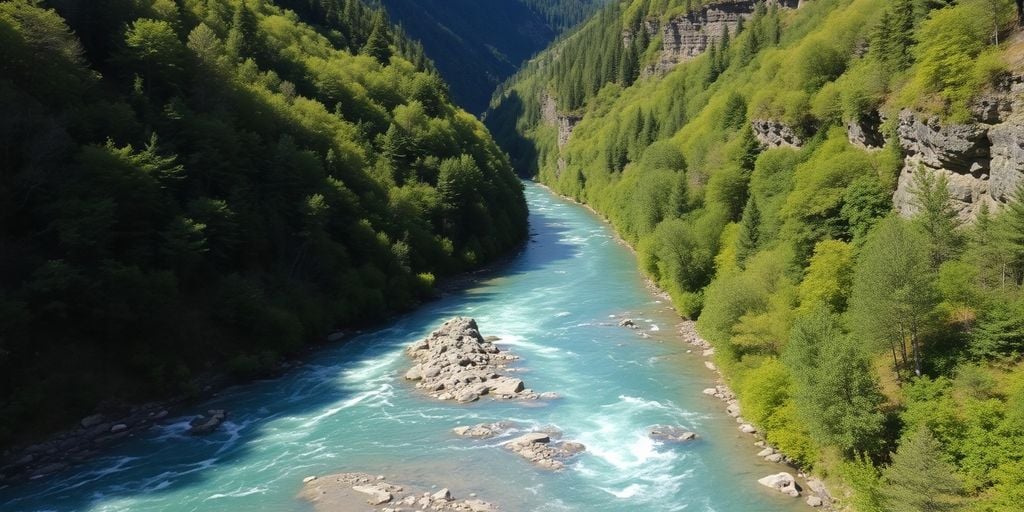Environmental activists in North Macedonia are engaged in a prolonged standoff against developers of small hydropower plants, asserting that these projects threaten the country’s pristine rivers and vital ecosystems. Protesters have blocked construction sites, vowing to remain until licenses are revoked and machinery removed.
Key Takeaways
- Activists have blocked construction sites on Mount Kozuf for over a month, demanding the cancellation of licenses for two proposed hydropower plants on the Dosnica River.
- Opponents argue that the projects will devastate vital ecosystems, dry up rivers, and harm protected species, despite developers claiming adherence to environmental standards.
- While the Balkans have seen a boom in hydropower, small plants contribute minimally to North Macedonia’s energy supply (4% in 2020).
- Climate change poses a significant threat to hydropower generation, with projections of substantial reductions in output in some regional basins by 2050.
- Despite government statements about dialogue, the license for the Dosnica project was recently extended, fueling activists’ resolve to continue their protests.
Standoff on Mount Kozuf
For over a month, environmental activists have maintained a blockade on roads leading to Hydro Dosnica’s construction sites on Mount Kozuf. They are protesting two proposed small hydroelectric power plants on the Dosnica River, which they claim is one of the country’s last healthy rivers. Activist Marina Tomova stated, "Until the licenses are cancelled and all machines are removed from the river Dosnica, we will not move." Opponents argue that the plants will devastate a crucial ecosystem already strained by decreasing rainfall and hotter summers. Protesters accuse Hydro Dosnica of breaching its license by illegally felling forests and causing irreparable damage to the river’s upper basin. Concerns are high that the river, which slows significantly in summer, would run dry if diverted. Kiril Ruzinov, a protester, warned that the river "cannot fill a tenth of the pipe. If it is put into a pipe, the whole riverbed will be extinct." Hydro Dosnica has refuted these allegations, calling them "incorrect and tendentious," and insists the project adheres to all environmental and technical standards.
The Broader Hydropower Landscape
Across the Balkans, governments have encouraged hundreds of hydropower developments with lucrative subsidies, attracting investors seeking renewable energy sources. A 2024 report by EuroNatur and Riverwatch indicates that the Balkans host approximately 1,800 hydropower plants, with over 3,000 more planned. The vast majority are small-scale plants, similar to those on the Dosnica. North Macedonia currently operates around 125 small hydropower plants and plans to nearly double this number. Despite the push for hydropower, these small plants contributed only four percent of North Macedonia’s total energy production in 2020, according to the state audit service. Protest movements have emerged throughout the region, arguing that the ecological impact and disruption to local communities far outweigh the energy output from these small facilities. The report also notes a slight slowdown in new planned builds since 2022, with hundreds of slated projects having been cancelled.
Environmental Concerns and Climate Impact
The Dosnica River, a tributary to the Vardar, is one of North Macedonia’s few rivers clean enough for drinking and is home to "exceptionally" valuable animals, including several protected species, according to the environmental non-profit Eko Svest. The NGO, alongside scientists, has urged the government to officially protect the river. The government previously stated it was "closely monitoring public reactions" and ready for "open and constructive dialogue." However, it recently extended the development license for the Dosnica project until April 2026. Climate change, bringing hotter, drier summers and more extreme flooding, poses a significant challenge to hydropower generation globally. A 2023 study, funded by the United Nations Economic Commission for Europe, projected that climate change could reduce yearly hydropower generation by up to 52 percent by 2050 in some regional river basins. Activists remain resolute. Risto Kamov from Changemakers4All affirmed, "We are not backing down, and we will stay to protect Dosnica and Kozuf."
Sources
- ‘Not backing down’: activists block hydro plants in N.Macedonia, FOX 11 and FOX 41.






